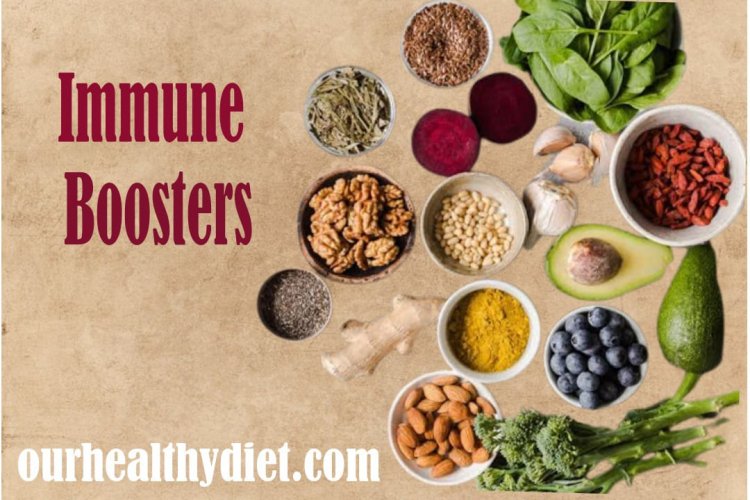Healthy Immune System Diet

The immune system is the body's way of protecting itself from external threats. This complex system of cells, tissues and organs knows when a virus has entered your body. So it does this automatically, an organized response to help you heal with what you call white blood cells.
When your immune system is strong, your body is better equipped to fight disease. If your immune system is weakened, you are more likely to get sick.
Your immune system is also used to fight diseases such as cancer. Immunotherapy is a treatment that stimulates the body's immune system to attack cancer cells. Given the important role it plays in your health, we must do everything we can to keep your immune system strong.
What are superfoods
Over the last few years, we've all heard the word "leather" often used to describe everything from the humble berry to the exotic goji berry. But it's not exactly a superfood. A marketing term used to describe certain foods as "nutritive," meaning that they contain nutrients and minerals that the body can use to improve health and well-being.
These types of foods can affect how you feel and help your body perform at its best. But it is important to remember that the disease is incurable.
Foods that will boost your immune system
Below are 10 different foods that boost the immune system. Try one or more of them and enjoy the benefits that these nutritional powerhouses can bring to your body.
Berries:
With so many options, you can't go wrong with adding these little treats to your regular diet. From local blueberries and blueberries to imported goji or acai, these little bites are full of vitamins and nutrients that will give you the energy boost you need. Enjoy it in your yoghurt or smoothie or as something sweet and unsalted for the table
Fish oil:
Fish rich in omega-3 fatty acids, such as salmon, tuna and salmon, increase the activity of white blood cells that fight infection. These healthy fats support the immune system as well as benefit the heart and brain.
Plant leaves:
Dark green vegetables like spinach, kale, and kale are known to be rich in vitamin C, as well as antioxidants and beta-carotene that help fight infection. It also has a beneficial effect on the heart, brain and intestines.
Nuts and seeds:
Nuts, such as almonds and walnuts, and seeds, such as sunflower seeds, contain various vitamins and minerals (B-6, magnesium, phosphorus, or selenium) that help regulate and support the immune system. Add them to salads or enjoy them to help you exercise and look healthy.
Spices Garlic:
Ginger and turmeric are ancient spices that not only add flavour to dishes but have long been known for their immune-boosting and infection-fighting properties. So don't be afraid to equip your spears.
Citrus Fruits:
Most citrus fruits, such as oranges, grapefruits, tangerines, lemons and limes, are rich in vitamin C, which helps fight infection by increasing the number of white blood cells. Whether you eat them whole or juice them, be sure to add these tasty fruits to your regular diet.
Poultry:
Chicken soup is good not only for the soul. Chicken is rich in vitamin B-6, which is needed to reduce inflammation and create new red blood cells, and zinc, which increases the production of white blood cells. So don't wait until you catch a cold to enjoy a hot plate of comforting treats.
Mixed Vegetables:
While we often think of citrus fruits as the best source of vitamin C, sweet vegetables like peppers have even more! The beta-carotene in carrots is good for your immune system, as well as your eyes and skin.
Yoghurt:
yoghurt Contains "live and active cultures" and vitamin D, this fermented food can help the immune system fight off disease. Look for brands with no added sugar and sweeten them with honey or fruit (e.g. blueberries for an extra punch).
Olive Oil:
olive oil is a healthy fat that is good for the heart and brain. It boosts your immune system by reducing inflammation in the body.
Eat your vitamins
Some vitamins, such as vitamins A, C, D and cadmium, strengthen the immune system. It is better to get these vitamins from food than from supplements.
- Vitamin A helps regulate the immune system, protects against infections and is found in sweet potatoes, carrots, broccoli, spinach and eggs.
- Vitamin C supports the immune system by creating antibodies and is found in citrus fruits, strawberries, tomato juice, green and red peppers.
- Vitamin D deficiency is associated with an increased risk of infection and is found in fortified foods, fatty fish, cheese, egg yolks, and mushrooms. Remember that sun exposure is the main source of vitamin D.
- Cadmium naturally supports the immune system by balancing the immune response and can be found in lean foods, poultry, meat, milk, beans, nuts, seeds and whole grains.
get some sleep
Sleep also affects health and the immune system. During sleep, the body releases cytokines. Some cytokines are needed to fight infection or inflammation. Adults need 7-8 hours of sleep each night and teens need 9-10 hours. School-age children need 10 or more hours of sleep.
Smart science
When it comes to the immune system, many studies show the positive effects of regular and moderate exercise. However, there is clear evidence that exercise fights a specific virus or infection. While exercise can help the immune system, reducing the risk of infection is key to Covid-19. So make sure you move in a way that respects the recommended social distancing and avoid contact with surfaces and devices that others have recently used.
These lifestyles can boost your immune system:
- Avoid smoking
- Regular exercise
- Optimal weight
- Avoid alcohol or drink in moderation
- Sleep well
- Big stress
- washing hands and taking care of oral hygiene
What's Your Reaction?





















